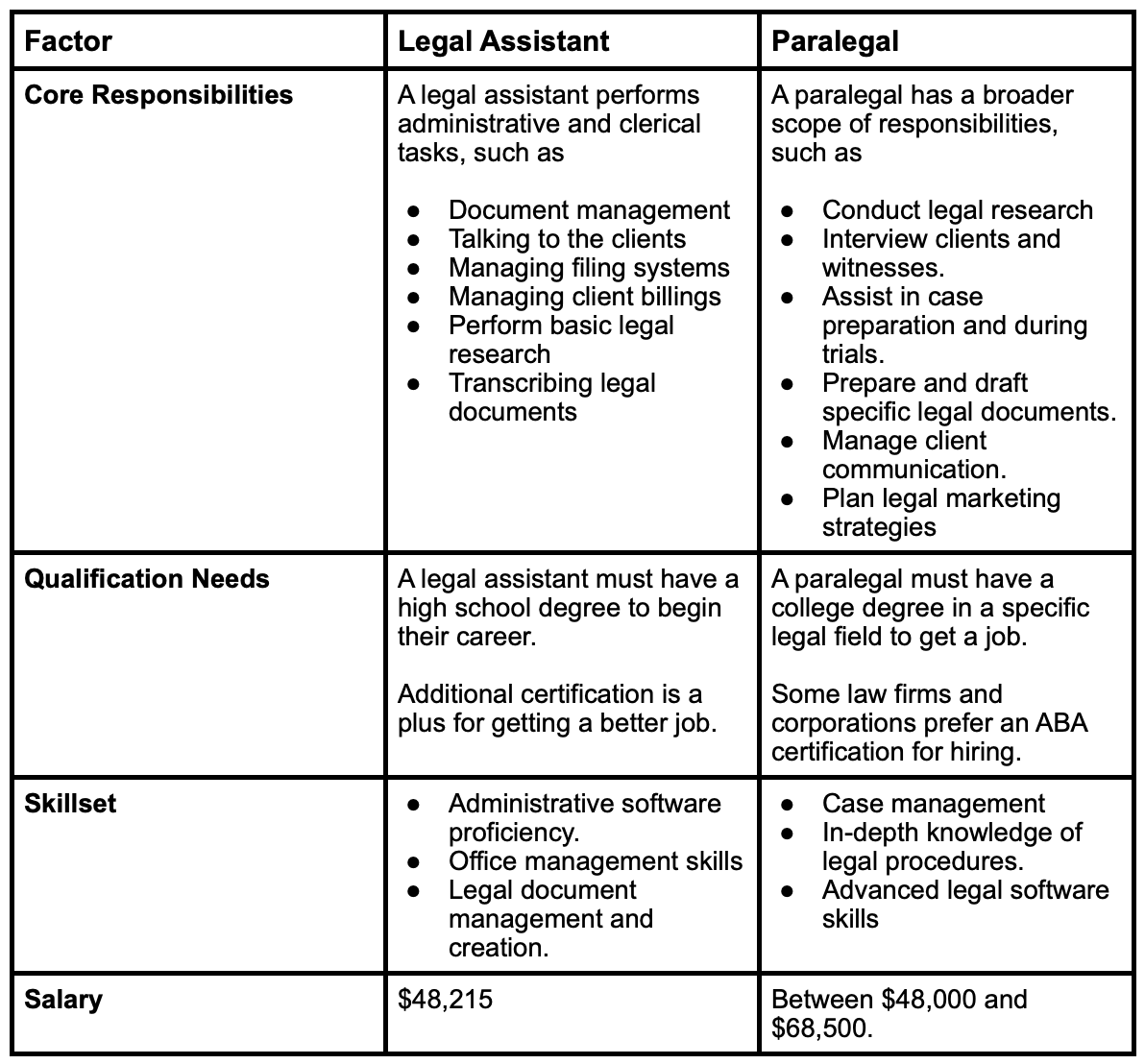A paralegal has slightly different responsibilities than a legal assistant.
The usual court proceedings involve lawyers, their clients, and judges. However, this is only part of the story. Several other people are vital in supporting and streamlining the legal processes.
Paralegals, legal assistants, and other staff members work behind the scenes to facilitate legal proceedings. Various people are assigned legal tasks in a law firm or a corporate legal department.
While lawyers handle in-court proceedings, paralegals and legal assistants assist them. Their responsibilities overlap, which is why they are often grouped. But they shouldn’t be.
Paralegals and legal assistants differ from each other in some ways. Let’s read ahead and uncover these differences.
What is a Legal Assistant, and What Do They Do?
Legal assistants, sometimes known as legal secretaries, collaborate with lawyers to provide legal and administrative support. Legal assistants are expected to undertake the following tasks for a law firm.
- Conduct comprehensive legal research;
- Draft and proofread legal paperwork;
- Collect and sort legal documents like evidence;
- Manage client’s billing;
- Maintain filing systems;
- Organize the lawyer’s calendar and schedules;
- Coordinate with clients and witnesses.
What is a Paralegal, and What Do They Do?
A paralegal has slightly different responsibilities than a legal assistant. For example, a paralegal caters to a broader need for a lawyer.
According to the words of Sagi Shaked, Founder of Shaked Law Personal Injury Lawyers, a paralegal is a person qualified by education, training, or work experience employed or retained by a lawyer, law office, corporation, governmental agency, or other entity and performs specifically delegated substantive legal work for which a lawyer is responsible.
A paralegal has the following roles and responsibilities:
- Investigate the case and evidence
- Conduct legal research
- Manage client communications and keep them updated
- Conduct interviews with the clients and witnesses
- Attend legal proceedings with the lawyers
- Demonstrate exhibits used in court
- Assist at closing and trials
Legal assistants’ and paralegals’ responsibilities can overlap. However, a paralegal needs a specialized education, such as a college degree, while a legal assistant does not.
Right now, the demand for both professionals is high in the market. According to statistics, the need for paralegals will be high in the next decade. There will be around 38,000 job openings for paralegals. Moreover, the legal assistant and paralegal professions are expected to grow by 14% between 2022 and 2032.
If we talk about choosing between the two, it entirely depends on
- Individual preferences
- Educational background
- Job market trends
Educational Requirements for Paralegals and Legal Assistants
Wondering about whether to become a paralegal or legal assistant and how to become one? Well, here is everything you need to know.
Let’s discuss the educational requirements first!
- To become a legal assistant, the candidate needs at least a high school diploma. Furthermore, no particular experience is required.
- On the other hand, if a candidate wants to be a paralegal, they need to have an ABA-approved bachelor’s or associate’s degree.
Besides, some law firms like Roman Austin Personal Injury Lawyers or corporations have different educational criteria when hiring a legal assistant or a paralegal. For example,
- Some might require a paralegal to have an ABA-approved certification. It is unnecessary but boosts the odds of getting a better job. The candidate can choose from Certified Paralegal (CP), Professional Paralegal (PP), or American Alliance Certified Paralegal (AACP) certifications.
- Based on the type of business, paralegal candidates might be expected to have a degree in a specific subject. These can be criminal law, immigration, family law, real estate, etc.
Further, candidates who want to be paralegals should complete an internship at a law firm like Zayed Law Offices.
Job Requirements for Legal Assistants vs. Paralegals
Well, as per stats, the increase in the salary of a paralegal is 7% in the last five years. Currently, the average salary of a paralegal stands at $49,943. Now, if someone wants to avail the pros of being a paralegal, there are specific necessary skills on the job:
Detail-oriented
A legal assistant and a paralegal must be meticulous about the details. A single error in the client’s information can quickly lead to the loss of the entire case.
Time management
Paralegals or legal assistants can work with several clients simultaneously, so they need to have time management skills. They must prioritize tasks and manage them effectively.
Legal research
Legal proceedings may involve many technicalities and essential factors. Therefore, paralegals and legal assistants must have research skills to absorb important information from complex data.
Organizational skills
Legal documents can be complex and numerous. Therefore, a legal assistant and a paralegal should have the expertise to organize and manage them. They should also be proficient in managing calendars, tracking important dates, planning legal marketing strategies, and doing digital marketing for lawyers, and meeting deadlines.
Critical thinking
A legal assistant and a paralegal should have critical thinking skills. Presenting a legal case requires absolute critical thinking and analytical skills.
A paralegal and a legal assistant must also have specific other specialized skills for a job. Here are some of them:
- Legal discovery;
- Legal pleading;
- Proofreading;
- Legal deposition;
- Legal hearing.
Legal Assistants vs. Paralegals | Salary
There is a significant difference between the salaries of a legal assistant and a paralegal. The salaries in both professions vary based on location, experience, and skill set.
- The average salary of a paralegal in the US ranges between $48,000 and $68,500. The highest average wage is in California, around $71,800.
- In contrast, the average salary of a legal assistant is around $48,215 in the US. However, if you are in the top tier of professionals, you can make close to $66,500.
Legal Assistant vs. Paralegal: Differences and Similarities
Here is a side-by-side comparison of the differences between a legal assistant and a paralegal.

Similarities Between A Legal Assistant and A Paralegal
Well, there are some similarities between a legal assistant and a paralegal:
- First, most of the job responsibilities coincide with each other.
- Second, most small law firms combine these roles, and a single individual performs both tasks.
- Due to similar roles and responsibilities, the federal government has clubbed these profiles in its reports.
Will AI Replace Paralegals and Legal Assistants?
Well, if we look at the current applications of AI, it can analyze loads of data within minutes. In those terms, AI can replace paralegals and legal assistants. On the other hand, the job roles are broader than just handling and making sense of data.
“Client communication is a necessary aspect of lawsuits that legal assistants and paralegals handle. From this perspective, the need for an AI does not overpower that of a paralegal. Human intervention is necessary for clients to communicate their statements and wishes. Moreover, they must convince the witnesses to provide a specific statement in court and make nuanced decisions.
Overall, AI will affect the job market for legal assistants and paralegals by taking control of it. However, entirely replacing them is different from how the future will look.
Guidelines For Lawyers Working With Paralegals and Legal Assistants
Paralegals and legal assistants working with lawyers or attorneys cannot practice law. Moreover, specific guidelines must be followed when a lawyer works with a paralegal. The ABA guidelines define the responsibilities of a lawyer while working with a legal assistant or a paralegal.
- A lawyer is responsible for a paralegal’s professional actions while performing services at the lawyer’s direction.
- A lawyer may delegate any task usually performed to a paralegal, except those proscribed to a non-lawyer by court rule, statute, administrative rule, or regulation, provided the lawyer takes responsibility for the work.
- A lawyer may not delegate some tasks to a paralegal, such as establishing an attorney-client relationship, establishing the fee for a service, and providing legal advice to a client.
- A lawyer is responsible for ensuring that the court and legal professionals know that the paralegal working for him or her is not licensed to practice law.
- A lawyer should identify paralegals by name and title on the lawyer’s letterhead and business cards.
- A lawyer is accountable for taking reasonable measures to ensure that a paralegal preserves all client confidence.
- A lawyer should take the required actions to prevent conflicts of interest from a paralegal’s other employment.
- A lawyer may include a charge for the work done by a paralegal in setting a charge and handling legal services.
- A lawyer may not split legal fees or charges with a paralegal and should not pay the paralegal for referring legal business.
- A lawyer hiring a paralegal should facilitate their participation in appropriate continuing education and pro-bono public activities.
Conclusion
Whether you are a legal assistant or a paralegal, you are bound to get a job. The scope of both profiles is vast, so choosing between them depends on how much a person wants to earn. As a paralegal, one can earn more while the educational qualifications required are also high, especially if you want to work in a prestigious organization.
On the other hand, most small firms hire a legal assistant due to budget constraints. Moreover, a fresher legal assistant learns a lot in a startup.


Join the conversation!